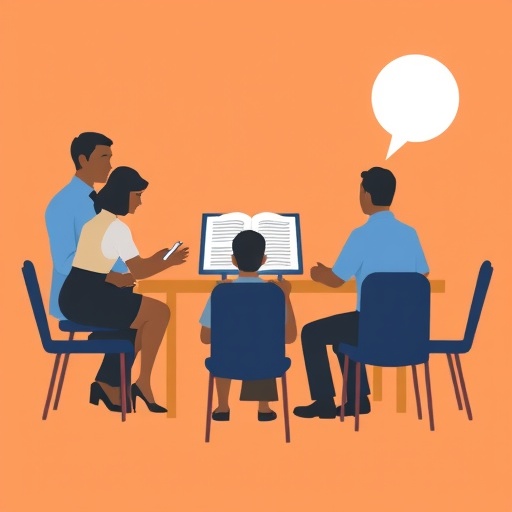In a groundbreaking study conducted by the UF Health Cancer Center, a striking revelation has emerged about the overwhelming prevalence of misinformation among newly diagnosed cancer patients. The research, soon to be published in the Journal of Cancer Education, exposes that an astonishing 93 percent of individuals facing a fresh cancer diagnosis have been exposed to at least one form of misinformation related to cancer treatments. This unsettling discovery sheds light on a critical, yet often overlooked, challenge within oncology – the infiltration of unproven or disproven cancer treatment claims, myths, and misconceptions into the lives of vulnerable patients.
The research team, led by senior author Dr. Carma Bylund, professor and associate chair of education at the UF Department of Health Outcomes and Biomedical Informatics, highlights that misinformation exposure is so pervasive that clinicians should now operate under the assumption that their patients have encountered misleading information before even their first consultation. This exposure is often incidental, with patients frequently encountering false claims about cancer treatments passively rather than through deliberate online searches.
Dr. Bylund emphasizes the significance of this phenomenon, noting that misinformation reaches patients through diverse and sometimes subtle channels. It is not only the internet or social media platforms where spurious content thrives; instead, misinformation often circulates interpersonally via friends, family, and acquaintances who become conduits of unverified or false treatment claims. This social dissemination magnifies the reach and influence of misinformation, complicating efforts to provide evidence-based care.
Working alongside oncologists, Dr. Bylund and first author Dr. Naomi Parker, assistant scientist at the UF Department of Health Outcomes and Biomedical Informatics, are pioneering an innovative intervention termed an “information prescription.” This approach involves proactively guiding patients towards credible, evidence-based resources such as the American Cancer Society, helping them navigate the overwhelming and often contradictory cancer treatment landscape. The strategy aims to counteract misinformation by empowering patients with verified knowledge at critical decision-making junctures.
The study meticulously utilized survey methodology to quantify exposure, focusing on patients diagnosed with prostate, breast, colorectal, or lung cancer within six months of initial diagnosis—a window crucial for treatment decision-making. Researchers framed survey questions around five distinct misinformation categories: vitamins and minerals, herbs and supplements, special diets, mind-body interventions, and miscellaneous treatments, supplemented by common treatment misconceptions adapted from National Cancer Institute materials.
One of the most concerning findings was that misinformation frequently reaches patients secondhand. Dr. Parker elaborated on this by describing the algorithmic environment of social media platforms, which, upon detecting a cancer diagnosis, curates and serves misleading content to patients, regardless of their active seeking behavior. For instance, despite no scientific basis, myths such as vitamin C curing cancer proliferate widely, posing a direct threat to patients’ treatment choices.
The psychological vulnerability of cancer patients—driven by anxiety, fear, and an influx of complex medical information—renders them particularly susceptible to misinformation. Such falsehoods can disrupt the patient-physician relationship, decrease adherence to evidence-based treatments, and in severe cases, increase mortality risk. Understanding this dynamic underscores an urgent need for healthcare providers to adapt communication strategies that acknowledge and directly address misinformation exposure.
Unlike prior research primarily focused on analyzing the prevalence of misinformation content on platforms such as TikTok or Facebook, this study shifts the lens to examine real-world patient experiences and perceptions. By doing so, it bridges a significant gap in cancer misinformation research, emphasizing the impact on patient behavior and clinical outcomes, rather than merely content analysis.
Collaboration with internationally recognized cancer misinformation researcher Dr. Skyler Johnson of Huntsman Cancer Institute enriched the study’s methodological rigor and relevance. This partnership fostered a robust survey instrument capable of capturing nuanced patient exposures to a spectrum of unproven treatments and myths, lending credibility and reproducibility to the results.
The survey revealed that the majority of participants had not only encountered misinformation but rarely discussed these erroneous treatments with their oncologists. This communication gap is alarming, as uncorrected misconceptions can lead patients to decline or delay effective treatments. Addressing this void is critical to ensuring optimal cancer care and patient safety.
Looking forward, the research team plans to expand the study cohort to include a broader demographic spectrum, allowing for a more comprehensive understanding of misinformation’s pervasiveness across diverse populations. Furthermore, they intend to rigorously evaluate the efficacy of interventions like the information prescription, with the goal of integrating these strategies into routine oncology practice.
Dr. Bylund succinctly encapsulates the study’s implications, asserting that while digital media remains the origin of misinformation, its transmission often transforms into a complex social phenomenon as it permeates through interpersonal channels. This insight calls for multifaceted approaches combining media literacy, clinician engagement, and patient education to combat misinformation’s insidious effects.
This seminal work not only advances scientific understanding of cancer misinformation exposure but also sets a precedent for proactive, patient-centered communication strategies in oncology. As misinformation continues to evolve with technological advances, studies like this pave the way towards safeguarding evidence-based medicine and ultimately improving outcomes for patients worldwide.
Subject of Research: People
Article Title: Assessing Cancer Patients’ Exposure to Treatment Misinformation
News Publication Date: 6-Sep-2025
Web References:
- UF Health Cancer Center: https://cancer.ufl.edu/
- Journal Article DOI: http://dx.doi.org/10.1007/s13187-025-02712-0
References:
- Bylund, C., Parker, N., Johnson, S. (2025). Assessing Cancer Patients’ Exposure to Treatment Misinformation. Journal of Cancer Education. https://doi.org/10.1007/s13187-025-02712-0
Keywords: Cancer, Oncology, Cancer treatments, Cancer policy




